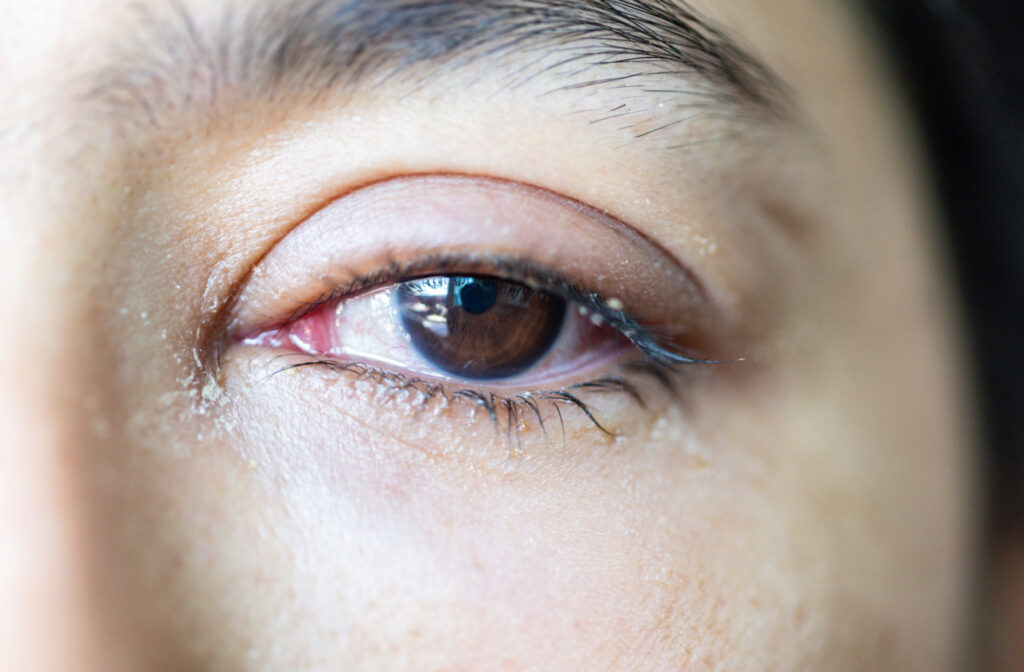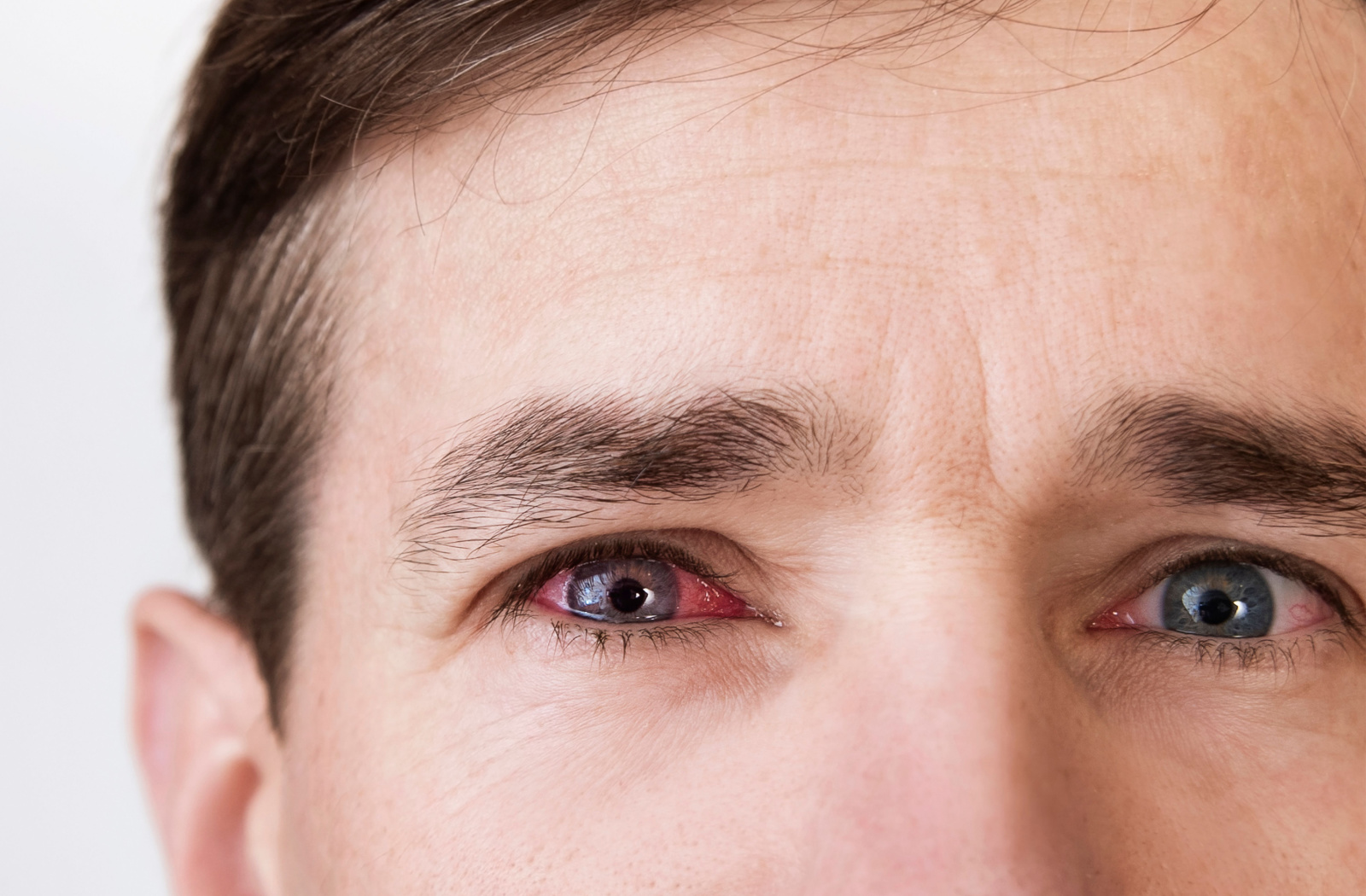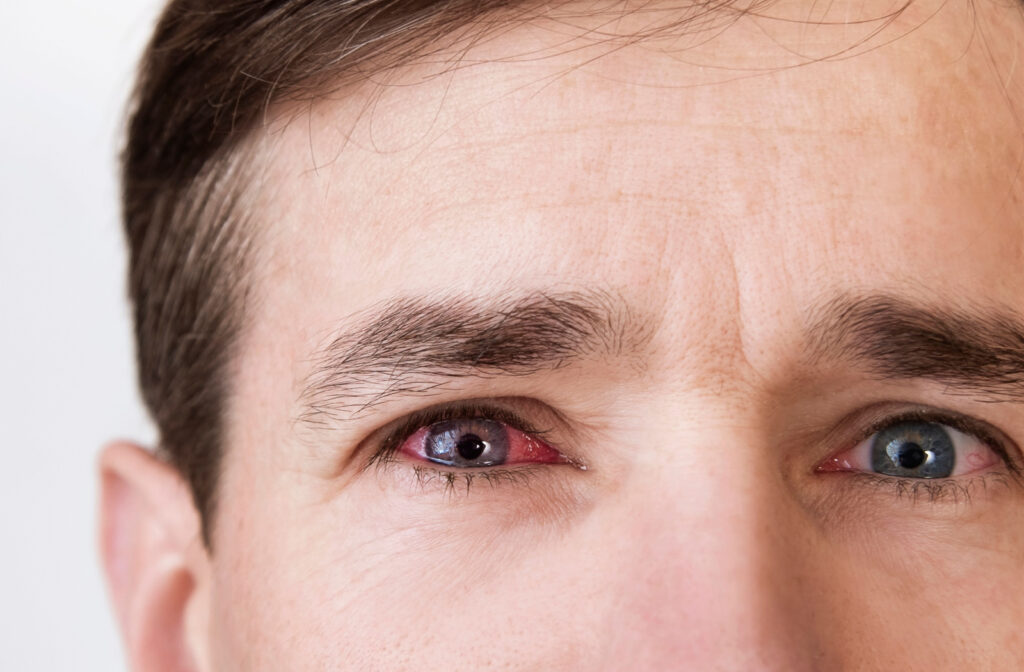It’s 8 AM, and you’ve just been rudely awoken by an irritating feeling in your eye. It’s red, swollen, and decidedly not its usual self. Or, maybe it’s not your eye that’s affected—maybe it’s your child’s eye. Could it be pink eye (conjunctivitis)? Should you rush to the eye doctor, or can it wait until morning?
We understand how confusing and stressful these situations can be. If your pink eye is causing pain or the symptoms aren’t improving after 24 hours, you should see an eye doctor. Additionally, if your newborn has pink eye, you should see a doctor as soon as possible.
What Is Pink Eye?
Pink eye, medically known as conjunctivitis, is an inflammation or infection of the conjunctiva—the delicate, transparent membrane that lines your eyelid and covers the white part of your eyeball. This membrane is home to numerous tiny blood vessels, which become visibly inflamed when irritated, giving your eyes a reddish or pink hue, hence the term “pink eye.”
Types of Pink Eye
There are 4 primary types of conjunctivitis: viral, bacterial, allergic, and irritant or chemical. Understanding the differences between these types can help you determine the right course of action and learn when to seek professional medical attention.
Viral Conjunctivitis
Viral conjunctivitis often stems from airborne viruses. It frequently accompanies upper respiratory infections or common colds. This type of pink eye can be highly contagious and can result in large outbreaks of pink eye.
You can reduce the risk of spreading viral pink eye by maintaining good hand and eye hygiene. Wash your hands with soap and water, and avoid touching your eyes or face.
Bacterial Conjunctivitis
Unlike its viral counterpart, bacterial conjunctivitis is typically caused by various bacteria and is not airborne—transmission occurs through direct contact. However, it can be just as contagious. Children can be more likely to be affected by bacterial pink eye, but adults aren’t immune by any stretch.
As with viral pink eye, good hygiene can help stop bacterial pink eye from spreading.
Allergic Conjunctivitis
Allergic conjunctivitis arises when an allergen comes into contact with the eye, triggering an allergic reaction. While it can be just as irritating, this type of pink eye is not typically contagious. However, because it shares symptoms with other forms of conjunctivitis, proper diagnosis is essential for moving forward with effective care.
Common allergens include:
- Pollen
- Dust mites
- Mold
- Pet dander
- Some medicines
- Some cosmetics
Irritant & Chemical Conjunctivitis
Irritant or chemical conjunctivitis results from exposure to harmful foreign bodies. This can include smoke, dust, fumes, or chemicals getting into your eyes.
For example, chlorine in swimming pools could cause your eyes to become irritated. Much like allergies, someone with chemical pink eye usually can’t spread it to someone else.
There is a specific type of conjunctivitis caused by overwearing contact lenses. So, if you’re experiencing pink eye symptoms, it’s usually a good idea to set your contacts aside until they subside. If your symptoms are caused by an infection, you may need to dispose of your contacts and replace them with a new pair.

Pink Eye Symptoms
Given the diverse types of pink eye, the symptoms can vary significantly. However, there are some common symptoms that may suggest you’re dealing with conjunctivitis, including:
- Pink eyes or redness
- Swelling
- Watery eyes
- Discomfort, irritation, or burning
- Discharge
- Crusting
It’s important to remember that these signs can also indicate other eye conditions. Hence, an office visit is crucial for correct treatment.
When Should I See the Eye Doctor?
In dealing with pink eye, it’s never a bad idea to see an eye doctor when certain symptoms arise. While many cases of pink eye resolve without medical intervention, there are situations where attention from an eye care professional is crucial.
You should see an eye doctor for pink eye treatment if you experience any of the following symptoms alongside pink eye:
- Persistent or severe eye pain
- Sensitivity to light
- Worsening symptoms
- Blurred vision or any issues affecting your ability to see clearly
- Intense redness in one or both eyes
- A weakened immune system
These symptoms may indicate a more serious condition that warrants immediate care.
Also, if your newborn displays pink eye symptoms, you should see a doctor immediately. Newborns have delicate immune systems and can be more susceptible to complications arising from infections.
Treating Pink Eye
Dealing with pink eye can be an uncomfortable experience. Still, several remedies, both at-home and medical, can help alleviate symptoms and support your recovery.
Home Remedies
Some home remedies for viral or bacterial pink eye include:
- Taking ibuprofen
- Placing a warm, damp washcloth over the eyes
- Use lubricating eye drops to relieve irritation
- Taking a break from contact lenses
You can use similar methods to handle allergic pink eye. However, your first step should be to avoid the allergens causing your symptoms. It is generally recommended to speak with your eye doctor before trying any of the remedies above.
Medical Remedies
Your optometrist can diagnose the type of pink eye you have and prescribe an appropriate treatment. Depending on the type, treatment may include:
- Antibiotic drops or ointments
- Antiviral medications
- Allergy medications, such as eye drops with antihistamines
Find Relief from Pink Eye
Pink eye can be a frustrating and uncomfortable condition, but it is usually not serious. However, if you’re experiencing severe eye pain, your symptoms aren’t improving, you wear contact lenses, or you have other symptoms, you should seek help from your eye doctor.
Our team at The Eye Avenue can diagnose your pink eye and offer treatments for relief and comfort. Don’t let pink eye get out of control for you or your family—book an eye exam today!




